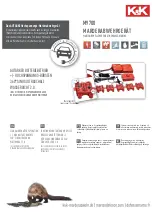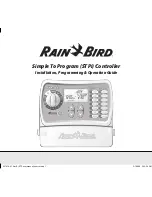
F180 Series
2
Specifications
Description
Excess flow check valves close when the flow rate
of air exceeds the valve’s rated flow capacity. They
are used to protect against the dangers of a whipping
hose. The valves are available in a variety of sizes
and body configurations.
When flow exceeds the valve’s setting, the valve
closes and remains closed until the system equalizes.
A built-in equalizing passage automatically opens the
valve once pressures on both sides of the poppet
are equal.
Specifications
CAUTION
If the valve is to be used in service other
than compressed air, contact the factory
to determine if the valve materials are
suitable for the particular service.
Valves with brass materials must
not be used on anhydrous ammonia
(NH
3
) service.
Installation
CAUTION
Do not install the valve in any hose or
piping which tends to restrict the valve
inlet. This may prevent the excess flow
valve from closing.
Flow through the excess flow valve must
be in the same direction as the flow
arrow stamped on the valve.
1. A rule of thumb for sizing excess flow valves is
to choose a valve with a closing flow 1.5 times the
maximum operating flow. For surge conditions,
2 times maximum flow may be required.
However, the excess flow valve’s closing flow rate
must be
less
than the capacity of the compressed
air system in which the valve is being used. The flow
rating of the piping, fittings, pump, valves, and hose
on both the inlet and outlet of the excess flow valve
must be
greater
than the flow rating of the excess flow
valve. If branching, piping length, additional valves,
reduction in pipe size, elbows, or other necessary
TYPE
INLET
CONNECTION,
INCHES
OUTLET
CONNECTION,
INCHES
MATERIAL
CLOSING
FLOW,
AIR SCFM
(meters
3
/min) AT
100 PSIG
(6,9 bar) INLET
PRESSURE
CLOSING FLOW
DIFFERENTIAL
PRESSURE,
PSIG (bar)
BODY LENGTH,
INCHES (cm)
WRENCH HEX,
INCHES (cm)
F186-06-1
3/4 MNPT
3/4 FNPT
Brass
171
(4,8)
11
(0,76)
1.85 (4,7)
1.31
(3,3)
F187-08-1
1 FNPT
1 FNPT
Brass
189
(5,4)
3.3
(0,23)
3.47
(8,8)
1.75 (4,4)
F187-12-1
1-1/2 FNPT
1-1/2 FNPT
Brass
416
(11,8)
4.7
(0,32)
4
(10,2)
2.25 (5,7)
F187-16-1
2 FNPT
2 FNPT
Brass
879
(24,9)
4.2
(0,29)
4.56 (11,6)
3
(7,6)
F188-24-1
3 FNPT
3 MNPT x
2 FNPT
Steel
1729
(49,0)
7.1
(0,49)
6.22
(15,8)
3.75 (9,5)
Maximum Operating Pressure:
250 psig (17,2 bar)
Maximum Differential Pressure:
15 psig (1,03 bar)
Closing Flow Tolerance:
+10% to -20% of rated flow






















